WALNEW USB-C Ethernet Adapter 2.5 Gigabit, USBC to RJ45 LAN
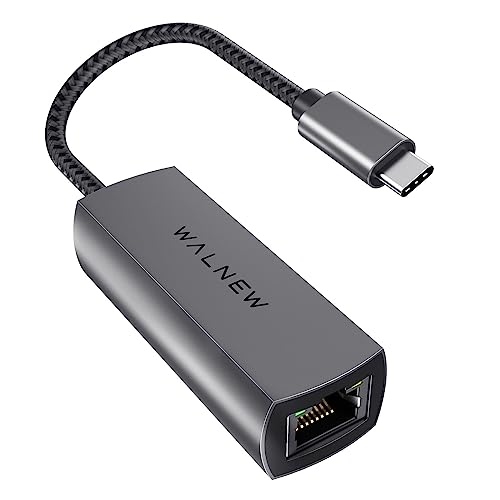
WALNEW USB-C Ethernet Adapter 2.5 Gigabit, USBC to RJ45 LAN Connector, 2.5Gb Network Cable Converter Thunderbolt 3 for NAS Server,Mac,MacBook Pro/Air,iPad 10,Dell XPS 17 15,Surface Laptop,Chromebook
From the brand


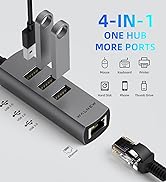
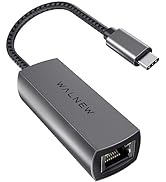
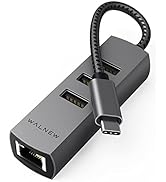
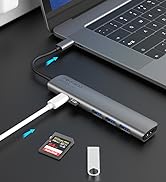

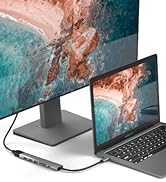
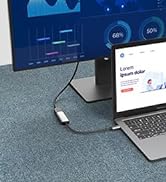


About WALNEW:
When you get WALNEW fantastic products, exactly what they were supposed to be. We add a little to make your daily life more convenient.
Our products don’t just protect or organize your items, they are responsible for cute design, durable and high quality.
Our friendly and hassle-free service will work hard to put a smile back on your face.
On my desktop system I can usually hit 2,100 Mbps regularly and this adapter hits a range of 1950-2030 Mbps across a dozen tests. No dropouts when downloading or transferring and maintained the same types of ping and jitter I receive with a wired connection. A bit pricey but a great performing portable or emergency option when you need a wired 2.5 Gbps via USB C.
I bought this Walnew USB-C 2.5gb ethernet adapter for my macbook pro and new iPhone 15 Pro. Once I plugged it in, my macbook pro speeds were really fast compared to on wifi. I’ve never plugged in an ethernet cable to my iPhone before either and when I plugged it in, my internet speeds were lightning fast. This adapter is great to travel with and fits into my backpack pockets easily. The build quality is nice; it has a braided cable and casing is made out of aluminum. It’s now compatible with most devices that have a USB-C port.
I don’t love USB ethernet adapters. For the most part, the gigabit ones I’ve tried have struggled to hit GigE speeds without bogging down system resources, but when you’ve got laptops and need to connect to something wired, there’s not much you can really do, right?
This adapter is surprisingly good, though. I’ve got 2.5 and 10 gig switches in my house, and connected to my ThinkPad X1 Extreme G4, I had no trouble connecting at 2.5 gigs on either switch, and was able to break gigabit on file transfers. It worked well enough that I used it on a couple of other laptops around my house to get backups started on my Synology NAS so that they can do differentials over wi-fi without taking a short eternity.
If you’ve got faster switches around or want to futureproof, you could do much worse.
Had no trouble using this on either my PC or my Mac laptop. Both identified the Realtek chip as being for 2.5 GBps ethernet and installed internal drivers. Only reason for four stars is that it’s more delicate than other USB-to-Ethernet adapters I’ve used. While the cable itself is very thick and strong, the box feels thin and plastic, not as tough as the steel casings I’ve found on other adapters.
Tested on a few machines Thinkpad X280 win/linux, Surface Go linux, and GPD MicroPC. Each could sustain 2.35 Gigabit/second over 30 minutes, except the Surface Go which was oddly limited to 2.18 Gbit/sec. Testing was done with iperf, requesting a 1M window, and 2 parallel connections.
On Linux I found it loaded the cdc_ncm driver by default which doesn’t seem to support higher MTU (jumbo frames). So in order to fully maximize the transfer rate you’ll need to use a different driver (and all devices on the network need to support the higher MTU as well). I had good results with the r8152 module. With a MTU of 9000 I could achieve 2.48 Gbit/s.
I ran into one quirk on Linux which turned out to be USB port power suspension. If you use utilities such as tlp or powertop they can enable it. This adapter will NOT activate the link at all when power saving is enabled. It can be pretty confusing because the kernel didn’t provide any messaging about it. The behavior was the network adapter’s LEDs would blink briefly, but not stay on and the interface would never come up. You can add the device id to a blacklist to prevent this.
Build quality is good. The aluminum case is sturdy though the corners are a bit sharp. The USB cable side only had only slight give when tugged on. Seems reasonably anchored, but I didn’t see a way to disassemble and check the internal construction.
Upon receiving the item, I was skeptical on the claims being 2.5GBps. On the first connection, it was able to get an IP and browsing the internet is wonderful, and its a bit faster than using wifi, even though the laptop has 5G wifi.
However, I wanted to check if the claim is true it can go up to 2.5Gbps. Although, before I make it sound bad, my internal network is 1Gigabit. With an HP gigabit switch, and all cable runs are Cat6. So of course, I’m limited in the test to really proof the claim. However, it does get around 949 Mbits/sec during the transfer using Iperf. This isn’t like running a speed test off a website. As that’s mainly what your provider is giving you.
I give this device 4 stars, as it does connect right away with no issues. Unless someone has a higher gig, such as running a 10Gb switch, they may be able to achieve higher. So I won’t say it’s bad. The results provided are the transfer speeds in the local network between the laptop, and router.
A USB adapter is perfect to add 2.5gb to a machine that doesn’t have any open PCI-E slots for a card. I have a 2.5gb home network for a DIY Plex server and a few other Windows drive shares. This USB adapter is by far the best one I’ve tried.
This adapter has almost miraculous thermal management. I’ve tried an ASUS adapter that would heat up and throttle the speed after 100GB or so. Also tried an Alxum adapter that had a big ol’ heatsink that would get hot enough to burn you and totally drop connection. This guy barely gets warm to the touch after a 400GB transfer.
The performance is also rock solid throughout the 400GB transfer as shown in the screenshot. It hits the advertised 2.5gb and does not throttle in the least. I tried it on 4 laptops and 2 desktops. It was plug and play on all but a Gigabyte laptop and a desktop with a Gigabyte motherboard. Driver installation is EZPZ when not detected though. The driver shows up as an emulated optical disk as shown in the 2nd screenshot. You just click on or auto run it and the driver will install and remove the emulated disk automagically. No hunting around and downloading drivers!
If you’re looking around for a 2.5gb adapter, your search has ended. 😉
This network adapter works right out of the box without any drivers downloaded (as far as I could tell). Plug it into an available USB-C port, plug in a working ethernet cable, and you have near instant connectivity.
Tests under Windows 11 and Ubuntu 22.04 show this adapter running up to 2.25 Gbe, well within the margin of error for an interface running with actual networking overhead. The lights flicker to life to reflect the high speed state of the connection. All good so far.
When using this adapter with Android 13, however, it’s a no-go. Android cannot find it and thus there isn’t any working connection when this adapter is plugged in. On ChromeOS it does report itself as connected, but the speeds are very slow: less than 1.0 Gbe in many cases. It’s hard to know if this is the fault of the low spec Chromebook or a compatibility issue. Testing with a 1.0 Gbe adapter found it running right to the limit, so your results may be different than mine.
If you need a Windows or Linux supported 2.5 Gbe interface, I can recommend this one. For other systems, it looks like you may need to find another option.
I got the WALNEW Ethernet Adapter mainly because it said it would work with a wide range of devices and Operating Systems. It was plug and play with my Windows 10 laptop which does not have a built in Ethernet port, so I am now free to undock from a docking station and move around. I also wanted it to provide an Ethernet connection for my Android 10 tablet but it does not work. So I am able to use it for 50% of my requirements. It is small and rugged so no complaints about quality of the product.